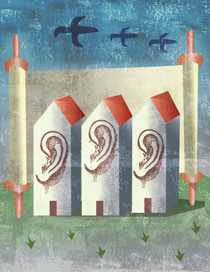Issue Archive
Commentary: Tapping and Tradition

“The walls have ears.” Rabbi Levi, in the Midrash (Leviticus Rabba 32:2), coined that ominous phrase 18 centuries ago to remind us always to be alert to the possibility of our words being overheard, including by spies of the state.
One may wonder, then, what insights Jewish tradition offers about the debate going on in our country now, pitting the privacy of citizens against the need for national security. Is there any justification for, say, the National Security Agency gathering data on our phone calls in search of warning signs of an impending terror attack?
Certainly, privacy is a Torah ideal. The Talmud recalls that after the Israelites fled Egypt and were camping in the wilderness, they arranged their tents so that “the openings… were not aligned one opposite the other” (Bava Batra 60a). That way, no one could spy on his neighbor.
But I can think of three reasons why, if the context were national security, the Torah might grant leniency to a government to protect its citizens.
First, the rabbis were realists. In the Mishna, Hillel warned, “Do not say of a matter that it is impossible it will be heard. For in the end, it will be heard” (Pirke Avot 2:5). Anyone who thinks that in the real world there can ever be a strictly guaranteed right of privacy isn’t, well, living in the real world.
Second, the rabbis understood that some particularly noxious crimes are secretive and that law enforcement must respond accordingly. Consequently, the Talmud permits covert surveillance against the ultimate subversive—he who entices others to worship foreign deities: “If [he] will entice you secretly, saying ‘Let us go and worship the gods of others’…” (Deuteronomy 13:7). The rabbis advise that the enticer be lured into a room where two hidden witnesses lie in wait. A person whom he has previously sought to entice then asks him to repeat his proposal. If the suspect makes a pitch for paganism, the witnesses jump out and bring him to court for punishment.
The Talmud notes, “We do not arrange [witnesses] to lie in wait to [apprehend] anyone else…except for this one”—namely, the enticer (Sanhedrin 67a). When a type of criminal acts in secret, his secretiveness should not simply be conceded to him as an advantage so he can elude detection.
In the end, the danger posed by the enticer is exactly that posed by the modern terrorist. In Leviticus, God describes the calamity that awaits the society that condones worshiping other gods: “I will destroy your lofty buildings and decimate your sun idols, I will cast your carcasses upon the carcasses of your idols, and My spirit will reject you. I will lay your cities in ruin…” (26:30-31). Idolatry is a catalyst of mass destruction.
Of course, Islamists aren’t idolators, and it is God who punishes idolatrous societies. But the urgency of the threat from idol worship is what drives the Torah to offer us a loophole. If the urgency in the war on terror is comparable, I expect the rabbis would appreciate our own need to limit certain legal protections.
Third, the Torah can be flexible. In his Mishne Torah, Maimonides summarizes the regulations that in the Jewish legal model would ordinarily make it difficult for the king or court to act against suspected law-breakers—for the protection of innocents. But when circumstances are dire, the executive branch (the king) may take steps beyond those in the Torah’s laws (see Hilkhot Melakhim 3:10).
Are today’s circumstances dire? Seemingly so. The most urgent threat America faces is from secret instigators of terror. Judaism’s realistic counsel would be, in short, to be realistic.
David Klinghoffer’s forthcoming book is Shattered Tablets: Why We Ignore the Ten Commandments at Our Peril (Doubleday).










 Facebook
Facebook Instagram
Instagram Twitter
Twitter
Leave a Reply